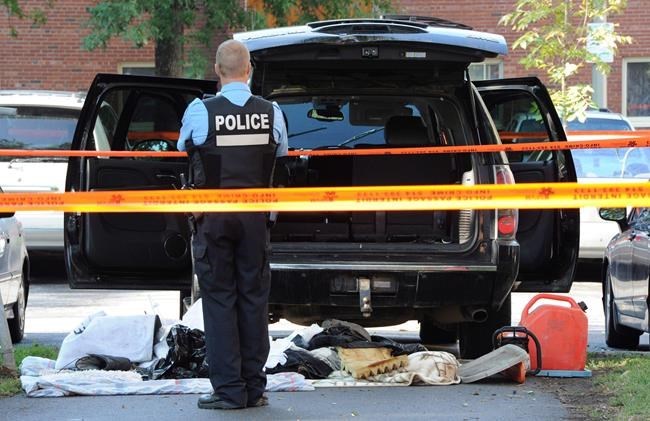MONTREAL — A technician who witnessed Quebec's fatal election-night shooting 10 years ago testified Wednesday as part of a lawsuit alleging that Montreal police and Quebec provincial police failed to properly secure the event.
Jonathan Dubé told the court that the trauma of witnessing the shooting of his close friend caused his life to unravel into hard drug use.
Four workers at the concert hall where the Sept. 4, 2012, shooting occurred are suing the City of Montreal and Quebec's attorney general for a total of more than $600,000, alleging they've suffered from post-traumatic stress and other psychological damage as a result.
Shooter Richard Henry Bain was convicted in 2016 on one count of second-degree murder and three counts of attempted murder after the shooting outside the concert hall as then-premier designate Pauline Marois was inside delivering a victory speech.
Lighting technician Denis Blanchette was killed in the attack and a second technician, David Courage, was injured after being struck by the same bullet.
The lawsuit, which was filed in March 2019, says the plaintiffs experienced "periods of depression and alcohol and/or drug dependence and have experienced feelings of shame and guilt" stemming from the trauma.
Dubé has never recovered from the death of his close friend, the lawsuit claims. On the stand, Dubé discussed his relapse into hard drug use that occurred following the event, after several years of sobriety.
While he started with ketamine, he then spiralled into heroin use, which he described as the "biggest battle of my life."
He said he had to be hospitalized a few months after his relapse, and has been on social assistance for most of the time since the attack.
Later, two of Dubé's friends testified that his personality had changed completely following the incident.
Audrey Bissonnette, a former neighbour, said Dubé changed from someone with a huge social circle who loved attending metal shows to a "hermit" who kept to himself.
"He was someone who was luminous, jovial, full of life," she said. "After the events, he lost it, that light. He didn’t have it anymore."
She said Dubé had appeared "tortured" by the events and had questioned why Blanchette lost his life while his own was spared.
The lawsuit says the plaintiffs had been waiting outside the back door of the venue to dismantle the stage when Bain approached and fired in their direction.
The shooter, armed with a semi-automatic assault rifle and wearing a bathrobe and a balaclava, fired a single bullet before his weapon jammed, according to legal documents.
He was arrested after a brief police pursuit, shouting "The English are waking up!" as he was taken into custody.
The lawsuit says two of the plaintiffs, Audrey Dulong Bérubé and Gael Ghiringelli, helped carry Courage into the building after the shooting, while another, Guillaume Parisien, was so close that Blanchette's body fell on top of him.
The plaintiffs allege the police failed to properly evaluate the risks associated with the event and that there were no police stationed outside the back door of the downtown venue or at other key areas.
The plaintiffs are asking for $125,000 each, as well as several thousand each for therapy and another lump sum of $100,000 in punitive damages.
The legal action was only filed several years after the event because it took time for the plaintiffs to process and recognize what had happened, the court document claims.
This report by The Canadian Press was first published March 30, 2022.
Morgan Lowrie, The Canadian Press

